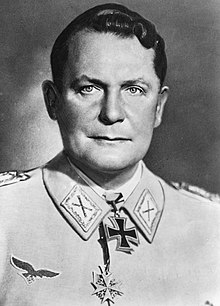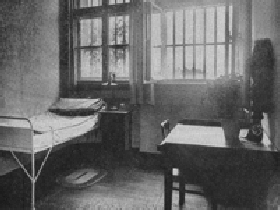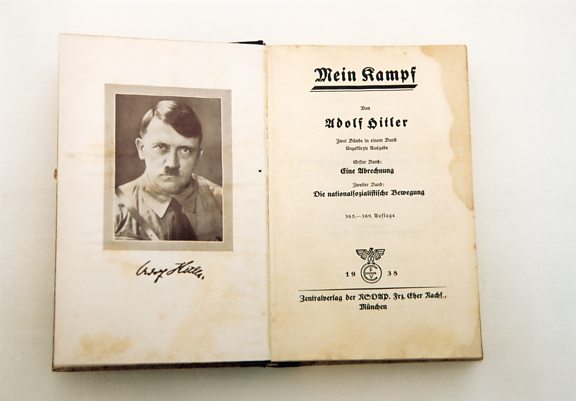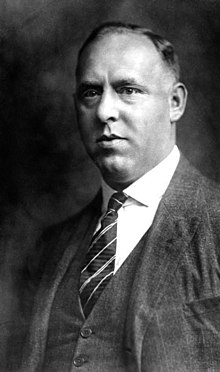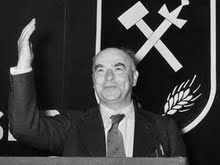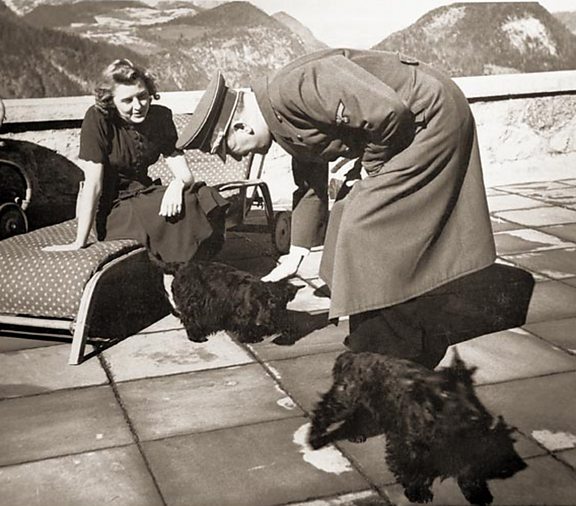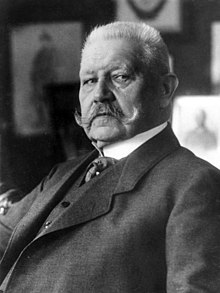In Part 4: Hitler Goes On Trial For High Treason And His Obsession With His Niece Comes To A Deadly End.
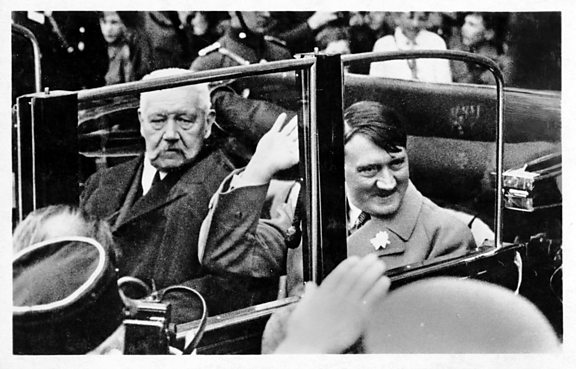
Hitler was now chancellor of Germany. He also basically had ultimate power thanks to the Enabling Act which gave him the ability to pass laws without Reichstag approval.
The Social Democratic Party was banned and its assets seized. Stormtroopers demolished union offices. In May of 1933 all trade unions were forced to dissolve and their leaders were arrested. Some were sent to concentration camps.
In July, Hitler's Nazi Party was declared the only legal political party in Germany.
In October, Hitler ordered Germany's withdrawal from the League of Nations.
At the risk of appearing to talk nonsense I tell you that the National Socialist movement will go on for 1,000 years! ... Don't forget how people laughed at me 15 years ago when I declared that one day I would govern Germany. They laugh now, just as foolishly, when I declare that I shall remain in power!
— Adolf Hitler to a British correspondent in Berlin, June 1934
In June 1934, Hitler ordered a series of political extrajudicial executions that was presented as a preventive measure against an alleged imminent coup called the Long Night of Thieves. Hitler had anyone that could possibly put his rule of Germany in danger as well as anyone that could reveal a possible homosexual past.
While people slept soundly in their beds, Hitler sent out assassins to take people from their homes, never to be seen again. This brings us back to German captain Ernst Röhm.
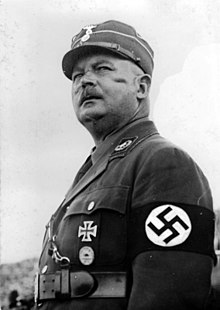
We talked about Röhm in Part 3: Precursor Of The Nazi Party. Röhm had helped Hitler recruited men for the German Workers' Party. He was also in charge of the storm troopers protecting Hitler. Now Hitler and his Nazi party had come to see Röhm as a potential rival as well as Gregor Strasser whom we just talked about in part 4.
One night Röhm had gotten drunk and expressed his concerns about Hitler's management of the on going revolution. Well, word got to back to Rudolf Hess.
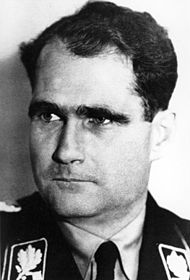
Rudolph Hess was shy, insecure and somewhat neurotic. He was oldest of his three siblings. He was born in British occupied Alexandria, Egypt (which was part of the Ottoman Empire). His family was wealthy and had originally came from Bohemia. His grandfather founded the import company Heß & Co. which Hess' father took over in 1888. Hess' mother was the daughter of a textile industrialist and Councillor of commerce from Hof, Upper Franconia. The family lived in a villa on the Egyptian coast near Alexandria, and visited Germany often.
Hess had contempt for non-white people and an admiration for the British Empire. He believed that the Egyptians couldn't accomplish anything on their own and credited all of the progress achieved in Egypt to the British. He thought that those from countries in north-west Europe like Britain and Germany, were the people destined to rule the world.
Hess attended a German language Protestant school in Alexandria. He also demonstrated aptitudes for science and mathematics, but his domineering father wanted him to join the family business, so Hess was sent to study at the École supérieure de commerce in Neuchâtel, Switzerland. Then he took an apprenticeship at a trading company in Hamburg.
When World War I broke out, Hess volunteered and enlisted in the 7th Bavarian Field Artillery Regiment. He was at the First Battle of Ypres, then he transferred to the 1st Infantry Regiment. He was awarded the Iron Cross, second class, and promoted to corporal. After additional training, he was promoted to senior non-commissioned officer and received the Bavarian Military Merit Cross. Returning to the front lines he participated in the battle for the town of Neuville-Saint-Vaast. After taking two months off with a throat infection, he served in the Battle of Verdun and was hit by shrapnel in the left hand and arm. After a month off to recover, he was sent back to Verdun.
Hess was promoted to platoon leader of the 10th Company of the 18th Bavarian Reserve Infantry Regiment. He was wounded twice. The first injury was a shell splinter to the left arm, which was dressed in the field, but the second was a bullet wound that entered the upper chest near the armpit and exited near his spinal column, leaving a pea-sized entry wound and a cherry stone-sized exit wound on his back. He was sent to hospital in Hungary and eventually back to a hospital in Germany. Later he received promotion to Leutnant der Reserve.
Hess received basic flight training at Oberschleissheim and Lechfeld Air Base and advanced training at Valenciennes in France. He was assigned to Jagdstaffel 35b, a Bavarian fighter squadron equipped with Fokker D.VII biplanes, but the war ended before he saw any action.
Hess was discharged from the armed forces in 1918. The family business interests in Egypt had been expropriated by the British. Hess joined the Thule Society, a secret anti-Semitic political organization devoted to Nordic supremacy, and the Freikorps. Hess was a participant in street battles in early 1919 and led a group which distributed thousands of antisemitic pamphlets in Munich.
In 1919, Hess studied history and economics at the University of Munich. His geopolitics professor was Karl Haushofer, a former general in the German Army who was a proponent of the concept of Lebensraum ("living space"). It was basically used to justify the belief that eastern Europe had to be conquered to create a vast German empire. Hess later introduced this concept to Hitler, and it became a basic principle of Nazi foreign policy. Hess became friends with Haushofer and his son Albrecht, a social theorist and lecturer.
Ilse Pröhl, a fellow student at the university, met Hess when they rented rooms in the same boarding house. They married and their only child, Wolf Rüdiger Hess, was named, at least in part, to honor Hitler, who often used "Wolf" as a code name.
After hearing Hitler speak for the first time in 1920 at a Munich rally, Hess became completely devoted to him and with absolute blind obedience. They held a shared belief that Germany's loss in World War I was caused by a conspiracy of Jews and Bolsheviks. Hess joined the Nazi and focused his attention on fundraising and organizational activities. He was a formidable fighter who brawled with others who often violently attempted to disrupt Hitler's speeches. In November 1921 he was injured while protecting Hitler from a bomb. Hess joined the Sturmabteilung( the storm troopers that protected Hitler that was lead by Röhm)and helped organize and recruit its early membership.
Hess was with Hitler at the Beer Hall Putsch. Hess and some SA men had taken a few of the dignitaries hostage, driving them to a house about 31 miles from Munich. When Hess left briefly to make a phone call the next day, the hostages convinced the driver to help them escape. Hess was stranded and called his wife to bring him a bicycle so he could return to Munich. He went to stay with the Haushofers and then fled to Austria, but they convinced him to return. He was arrested and sentenced to 18 months in prison for his role in the attempted coup. While in prison, Hess was one of the people wrote Mein Kampf as Hitler dictated it.
Hitler named Hess his private secretary in 1925, and named him as personal adjutant in 1929. Hess accompanied Hitler to speaking engagements around the country and became his friend and confidante.
Also in 1929, Hess obtained his private pilot's licence. His instructor was World War I flying ace Theodor Croneiss. In 1930 Hess became the owner of a BFW M.23b monoplane sponsored by the party newspaper. He also acquired two more planes and became a proficient pilot of light single-engine aircraft.
In 1932 Hess was named head of the Party Liaison Staff and Chairman of the Party Central Political Commission.
When Hitler was promoted to Chancellor, Hess was named Deputy Führer( Deputy Chancellor) of the Nazi Party. Hess was responsible for foreign affairs, finance, health, education and law. All legislation passed through his office for approval, except that concerning the army, the police and foreign policy, and he wrote and co-signed many of Hitler's decrees. Hess also spoke over the radio and at rallies around the country. He acted as Hitler's delegate in negotiations with industrialists and members of the wealthier classes. Hitler had him oversee the Nazi Party groups that were in charge of party members living in other countries. Hitler instructed Hess to review all court decisions that related to persons deemed enemies of the Party. He was authorized to increase the sentences of anyone he felt got off too lightly and was also empowered to take "merciless action" if he saw fit to do so. This often entailed sending the person to a concentration camp or simply ordering the person killed.
Hess founded the Volksdeutscher Rat (Council of Ethnic Germans) to handle the Nazi Party's relations with ethnic German minorities around the world. The council members were primarily loyal to Germany rather than their current nations. The eight council members, only one of which was a member of the Nazi Party, were responsible only to Hess. Members publicly claimed to be uninvolved in the council, which Hess used as proof that the Nazi Party was not trying in interfere in the domestic affairs of other nations. The council had considerable funds and appeared to be sufficiently independent of the German government.
In 1934, Hess gave a speech about Hitler.
"With pride we see that one man remains beyond all criticism, that is the Führer. This is because everyone feels and knows: he is always right, and he will always be right. The National Socialism of all of us is anchored in uncritical loyalty, in the surrender to the Führer that does not ask for the why in individual cases, in the silent execution of his orders. We believe that the Führer is obeying a higher call to fashion German history. There can be no criticism of this belief."
Needless to say, Hess fully and blindly supported Hitler. When Hess heard of what Röhm had said about his beloved leader he was angered and went and told Hitler.
The news of Röhm's outburst only deepened the rift between night Röhm and Hitler. Hitler and Röhm's plans for the government had veered onto different paths and Röhm's success could come only at Hitler's expense.
On April 11th, 1934, Hitler met with German military leaders on the ship Deutschland. It was surmised that President Paul von Hindenburg would likely die before the end of the year. Hitler informed the army hierarchy of Hindenburg's declining health and proposed that the Reichswehr support him as Hindenburg's successor. Hitler also offered to reduce the SA, suppress Röhm's ambitions, and guarantee the Reichswehr would be Germany's only military force. Hitler also promised to expand the army and navy.
In a move to isolate Röhm, on April 20th, 1934, the control of the Prussian political police (Gestapo) was transferred to Himmler.
In early June, Hitler was issued a demand from the defense minister Werner von Blomberg. Unless Hitler took immediate steps to end the growing tension in Germany, Hindenburg would declare martial law and turn over control of the country to the army. This put Hitler under pressure to act.
This brings us to the Long Night of Knives.
On June 30,1934, Hitler and a large group of SS and regular police flew to Munic and traveled to the Hanselbauer Hotel in Bad Wiessee, where Röhm and his followers were staying. The SA leadership were in bed sleeping and were taken by surprise. SS men stormed the hotel and Hitler personally placed Röhm and other high-ranking SA leaders under arrest. And Breslau SA leader Edmund Heines was taken out behind the hotel and shot.
When Hitler arrived back at party headquarters in Munich, he addressed the assembled crowd. Hitler denounced "the worst treachery in world history". Hitler told the crowd that "undisciplined and disobedient characters and asocial or diseased elements" would be annihilated.
Now, Joseph Goebbels set the final phase of the plan in motion. He telephoned Göring with the codeword kolibri ("hummingbird") to let loose the execution squads on the rest of their unsuspecting victims.
Hermann Wilhelm Göring was born in Rosenheim, Germany at the Marienbad Sanatorium. His father, Heinrich, was a former cavalry officer and had been the first Governor-General of German South West Africa. Heinrich had three children from a previous marriage. Göring was the fourth of five children by Heinrich's second wife, Franziska Tiefenbrunn. When Göring was born, his father was serving as consul general in Haiti, and his mother had returned home briefly to give birth. She left the six-week-old baby with a friend in Bavaria. Göring's parents didn't return for three years.
Göring's godfather was a wealthy Jewish physician and businessman his father had met in Africa who provided the family a home in Berlin-Friedenau, then in a small castle called Veldenstein, near Nuremberg. Göring's mother became the godfather's mistress around this time, and remained so for some fifteen years.
As a child, Göring enjoyed playing with toy soldiers and dressing up in a uniform his father had given him. He was sent to boarding school at age eleven, where he received harsh discipline. He sold a violin to pay for his train ticket home, and and pretended to be ill until he was told he would not have to return. He became a mountain climber. At sixteen he was sent to a military academy at Berlin Lichterfelde and graduated with distinction.
Göring joined the Prince Wilhelm Regiment of the Prussian Army. The next year his mother had a falling-out with his godfather and the family was forced to leave Veldenstein and moved to Munich. Then Göring's father died and World War I began. Göring was stationed at Mülhausen with his regiment.
While at Mülhausen, Göring was hospitalized with rheumatism from being in the damp trenches. While he was recovering, his friend Bruno Loerzer convinced him to transfer to the Luftstreitkräfte ("air combat forces") of the German army. The resquest was denied and Göring transferred himself. He flew as Loerzer's observer in Feldflieger Abteilung 25 (FFA 25). He was discovered and sentenced to three weeks' confinement to barracks, but the sentence was never carried out. Göring was then assigned to FFA 25 in the Crown Prince's Fifth Army. He flew reconnaissance and bombing missions. For this Göring was presented with the Iron Cross, first class.
Göring was assigned to Jagdstaffel 5 and was seriously wounded in the hip in aerial combat. He then was transferred to Jagdstaffel 26 and steadily scored air victories. Then he was assigned to command Jagdstaffel 27, serving with Jastas 5, 26, and 27. In addition to his Iron Crosses (1st and 2nd Class), he received the Zähringer Lion with swords, the Friedrich Order, the House Order of Hohenzollern with swords third class, and the Pour le Mérite.
On July 7th,1918, Göring was made commander of the "Flying Circus", Jagdgeschwader 1. He was arrogant and unpopular in his squardon.
Towards the end of the war, Göring refused to comply when he was repeatedly ordered to withdraw his squadron to surrender the aircraft to the Allies. Many of his pilots intentionally crash-landed their planes to keep them from falling into enemy hands.
Göring believed that the German Army had not really lost the war, but instead was betrayed by the civilian leadership: Marxists, Jews, and especially the Republicans, who had overthrown the German monarchy.
Göring moved to Sweden and joined Svensk Lufttrafik, a Swedish airline. Göring was often hired for private flights. He was then hired by Count Eric von Rosen to fly him to his castle from Stockholm. This was also the first time Göring saw his future wife Baroness Carin von Kantzow. Estranged from her husband of ten years, she had an eight-year-old son. They spent much time together through 1921, when Göring left for Munich to take political science at the university. Carin obtained a divorce, followed Göring to Munich, and married him.
Göring met Adolf Hitler and joined the Nazi Party in 1922 after hearing a speech by Hitler. He was given command of the Sturmabteilung (SA) as the Oberster SA-Führer in 1923. He was later appointed an SA-Gruppenführer (Lieutenant General).
Göring was with Hitler at the Beer Hall Putsch. Göring and was shot in the groin. With Carin's help, Göring was smuggled to Innsbruck, where he received surgery and was given morphine for the pain. This was the beginning of his morphine addiction. Meanwhile, the authorities in Munich declared Göring a wanted man.
By 1925, Carin's mother was ill. Göring had become a violent morphine addict. Carin, who was ill with epilepsy and a weak heart and had to give her son to the father. She also had to allow the doctors to take charge of Göring and he was placed in Långbro asylum. He was violent to the point where he had to be confined in a straitjacket. After he was weaned off the morphine, he left the facility briefly, but had to return for further treatment. He returned to Germany when an amnesty was declared in 1927 and resumed working in the aircraft industry. Carin died of heart failure in 1931.
In the May 1928 elections Göring was elected as a representative from Bavaria. In May 1931, Hitler sent Göring on a mission to the Vatican, where he met the future Pope Pius XII.
In the July 1932 election, the Nazis elected Göring as the President of the Reichstag.
After the Reichstag fire in 1933, the Nazis took advantage of the fire. Göring ordered a crackdown on communists and the Reichstag Fire Decree was passed the next day. This suspended basic rights and allowed detention without trial. Activities of the German Communist Party were suppressed, and thousands of Party members were arrested. Göring demanded that the detainees should be shot but the head of the Prussian political police ignored the order.
In January 1933, Göring was appointed as Minister of the Interior for Prussia, and Reich Commissioner of Aviation. In November, Göring established a Prussian police force, with Rudolf Diels at its head. The force was called the Gestapo. Göring, thinking that Diels was not ruthless enough and handed over control of the Gestapo to Himmler in April.
June 30th, 1934, Göring received the codeword and Sepp Dietrich received orders from Hitler to form an "execution squad" and go to Stadelheim prison where certain SA leaders were being held. In the prison courtyard the squad shot five SA generals and an SA colonel. Those not immediately executed were taken back to the Leibstandarte barracks at Lichterfelde, given one-minute "trials", and shot by a firing squad.
In Berlin, on Göring's personal orders, an armed SS unit stormed the Vice-Chancellery. The SS unit shot Papen's secretary Herbert von Bose. The Gestapo arrested and later executed Papen's close associate Edgar Jung and disposed of his body by dumping it in a ditch. The Gestapo also murdered Erich Klausener, the leader of Catholic Action, and a close Papen associate. Papen was unceremoniously arrested at the Vice-Chancellery, but was released days later.
Hitler and Himmler had the Gestapo had Kurt von Schleicher and his wife murdered at their home.
Gregor Strasser was also executed. He was shot once in a main artery from behind in his cell. On the orders of SS general Reinhard Heydrich, Strasser was left to bleed to death, which took almost an hour.
Gustav Ritter von Kahr, the former Bavarian state commissioner who crushed the Beer Hall Putsch in 1923 was brutally murdered too. He was abducted from his Munich apartment and tortured by two SS members while in route to a concentration camp. After his arrival there, Kahr was shot on orders of Theodor Eicke, the camp commandant. Kahr was taken to a nearby swamp and hacked to death with axes. His mutilated body was found outside the camp a few days later.
Röhm's personal adjutant, Karl von Spreti, died as he called out "Heil Hitler, I love Germany." He believed that an anti-Hitler SS plot had led to his execution just as many members of the SA did.
Several leaders of the disbanded Catholic Centre Party were also murdered.
Röhm was held at Stadelheim Prison in Munich. Then on July 1st, at Hitler's behest, Theodor Eicke, Commandant of the Dachau concentration camp, and his SS adjutant Michael Lippert visited Röhm. They handed him a Browning pistol loaded with a single cartridge and told him he had ten minutes to kill himself or they would do it for him. Röhm replied, "If I am to be killed, let Adolf do it himself." Ten minutes later they returned and Röhm was standing, with his bare chest puffed out in a gesture of defiance. Eicke and Lippert then shot Röhm dead.
After the purge, Göring instructed police stations to burn "all documents concerning the action of the past two days. " Goebbels tried to prevent newspapers from publishing lists of the dead, but at the same time used a radio address to describe how Hitler had narrowly prevented Röhm and Schleicher from overthrowing the government and throwing the country into turmoil.
On July 3rd Hitler had the cabinet approve a measure that declared, "The measures taken on June 30, July 1 and 2 to suppress treasonous assaults are legal as acts of self-defence by the State."
Signed into law by Hitler, Gürtner, and Minister of the Interior Wilhelm Frick, the "Law Regarding Measures of State Self-Defence" retroactively legalized the murders committed during the purge.
On July 13th, Hitler justified his actions in a nationally broadcast speech to the Reichstag:
"If anyone reproaches me and asks why I did not resort to the regular courts of justice, then all I can say is this. In this hour I was responsible for the fate of the German people, and thereby I became the supreme judge of the German people. I gave the order to shoot the ringleaders in this treason, and I further gave the order to cauterize down to the raw flesh the ulcers of this poisoning of the wells in our domestic life. Let the nation know that its existence—which depends on its internal order and security—cannot be threatened with impunity by anyone! And let it be known for all time to come that if anyone raises his hand to strike the State, then certain death is his lot."
Germany's leading legal scholar, Carl Schmitt, wrote an article defending Hitler's speech. It was named "The Führer Upholds the Law."
A special fund administered by SS General Franz Breithaupt was set up for the family of the victims of the purge.
The army almost unanimously applauded the Night of the Long Knives. A telegram allegedly sent by the ailing President Hindenburg expressed his "profoundly felt gratitude", and congratulated Hitler for "nipping treason in the bud". Later Hermann Göring later would admit that the telegram was never seen by Hindenburg, and was actually written by the Nazis. General von Reichenau went so far as to publicly give credence to the lie that Schleicher had been plotting to overthrow the government.
Rumours about the Night of the Long Knives rapidly spread. Many believed that Hitler had saved Germany from a descent into chaos.
Others were appalled at the scale of the executions and at the relative complacency of many of their fellow Germans. However, most of those who disapproved of the purge kept quiet about it for fear they would meet the same fate.
Among the few exceptions were General Kurt von Hammerstein-Equord and Field Marshal August von Mackensen. Hammerstein, who was a close friend of Schleicher, had been much offended at Schleicher's funeral when the SS refused to allow him to attend the service and confiscated the wreaths that the mourners had brought. Hammerstein and Mackensen sent a memo to Hindenburg demanding that Hindenburg punish those responsible for the murders, and criticized Blomberg for his outspoken support of the murders of Schleicher and Bredow. Hammerstein and Mackensen also asked that Hindenburg reorganize the government by firing Baron Konstantin von Neurath, Robert Ley, Hermann Göring, Werner von Blomberg, Joseph Goebbels, and Richard Walther Darré from the Cabinet. The memo asked that Hindenburg instead create a directorate to rule Germany, comprising the Chancellor (who was not named), General Werner von Fritsch as Vice-Chancellor, Hammerstein as Minister of Defense, the Minister for National Economy (also unnamed), and Rudolf Nadolny as Foreign Minister.
Hindenburg never responded to the memo and there might have been a chance it wasn't even passed along to him.
Amazingly, those offended by the murders did not blame the purge on Hitler. They just wanted some of Hitler's more radical followers removed.














